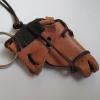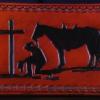Another important aspect is to use shorter lengths of thread when hand sewing. Think about it, if you sew 2 feet of stitch line at 6 spi, that's 144 holes. If you use a single piece of line, then the ends of the thread will have been through ALL the holes and can look dingy or ratty. Using a shorter piece of line, you reduce the 'wear' on the thread caused by sewing.
Regardless of the overall length of the stitch line, I try to keep my sewing threads to under 3 feet each. That means a foot and a half on each side, presuming you put the thread through a hole and center it. Then, when I'm down to about 6 inches of line, I start a new piece and complete 3-4 more stitches and snip. Then take the fresh line and stitch over the ends of the last one which both locks them down, AND hides them.
There's also something I've noticed about using waxed linen - when it's on the spool, it's twisted and has a good color. After several pulls through stitch holes, it has lost some of the twist which makes it more translucent. If you've dyed the leather before stitching and the thread has become untwisted, you may be seeing the leather color through the thread fibers. Look closely at the stitches and see if the fibers are still twisted tightly or if they're straighter. If they're pretty straight, start putting a full twist (or more) on the line before pulling it through the leather.









